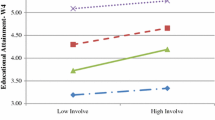Abstract
In a study examining children's social competence in elementary school settings, the authors had the opportunity to compare children who received parental permission to participate to children who did not receive permission. Results indicated that children who were not involved in the study were more likely to be viewed by teachers as having unsatisfactory relationships with peers than children who were in the study. The present results suggest that investigators begin reporting the number of children who do not participate in a given study and begin examining whether minors who receive parental permission differ on important dimensions from minors who do not receive such permission. Ethical considerations of the present study are discussed.
Similar content being viewed by others
References
American Psychological Association. (1983).Ethical principles in the conduct of research with human participants. Washington, D. C.: Author.
Department of Health, Education and Welfare. (1981).Institutional guide to DHEW policy on the protection of human subjects (NIH Publication No. 72-101). Washington, D. C.: U. S. Government Printing Office.
Ford, M. E. (1982). Social cognition and social competence in adolescence.Developmental Psychology, 18, 323–340.
Green, K., Beck, S., Forehand, R., & Vosk, B. (1980). Validity of teacher nominations of child behavior problems.Journal of Abnormal Child Psychology, 8, 397–404.
Keith-Spiegel, P. (1983). Children and consent to participate in research. In G. P. Melton, M. J. Koocher, & M. J. Saks (Eds.),Children's competence to consent. New York: Plenum Press.
MacCarthy, J. D., & Hodge, D. R. (1982). Analysis of age effects in longitudinal studies of adolescent self-esteem.Developmental Psychology, 18, 373–379.
Melton, G. P., Koocher, M. J., & Saks, M. J. (Eds.). (1983).Children's competence to consent. New York: Plenum Press.
National Commission for the Protection of Human Subjects of Biomedical and Behavioral Research (1977).Report and recommendation: Research involving children (DHEW Publication No. [OS] 77-004). Washington, D.C.: U.S. Government Printing Office.
Author information
Authors and Affiliations
Additional information
The authors wish to thank an anonymous reviewer for comments on earlier drafts of this manuscript.
Rights and permissions
About this article
Cite this article
Beck, S., Collins, L., Overholser, J. et al. A comparison of children who receive and who do not receive permission to participate in research. J Abnorm Child Psychol 12, 573–580 (1984). https://doi.org/10.1007/BF00916851
Revised:
Issue Date:
DOI: https://doi.org/10.1007/BF00916851




